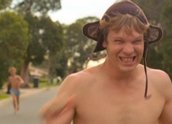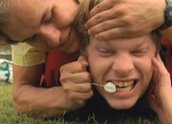


The Black Balloon (2007)
Synopsis
Thomas (Rhys Wakefield) is 15 and his life is in chaos. His autistic brother Charlie (Luke Ford) creates havoc wherever he goes; their mother Maggie (Toni Collette) is pregnant and has to stay in bed. Their father Simon (Erik Thomson) is a soldier trying to manage career, wife, autistic son and Thomas, in that order. At his new school in Sydney’s western suburbs, Thomas wants desperately to conceal his unusual family life – and especially his brother – from his classmates. That fails when Charlie, who also has Attention Deficit Disorder (ADD) and chooses not to speak, runs into a stranger’s house to use the toilet. Thomas’s classmate Jackie (Gemma Ward) recognises the two boys in her bathroom – one wearing only his underpants, the other with monkey ears on his head. She and Thomas become friends, which further complicates his emotions. At his 16th birthday party, Thomas cracks. The two brothers fight, as Jackie looks on in horror. Thomas finally realises that the desire to be ‘normal’ has almost destroyed his place in the family.
Curator’s notes
The Black Balloon is a clever amalgamation of two types of story – the coming-of-age romantic comedy, and a family drama with disability. It is highly autobiographical for director Elissa Down, who co-wrote the script. She grew up with three brothers, two of whom are autistic. Her father was in the army, so they moved a lot, and many of the things that Thomas experiences happened to her – such as having to chase her escaping brother down a suburban street. This sense of the lunatic humour of real life pervades the film and makes it distinctive. Down credits Jane Campion with encouraging this honesty in the scripting process. ‘I was holding back’, Down told interviewer Andrew Urban, ‘putting up a wall – until Jane told me to let it all out. “Who cares what people think?” she said. That helped free me up, and everything I felt could go into it.’
An early idea for the script had two brothers with autism, but Down says it just became too big, and too much like a movie-of-the-week about autism. The film as shot is as much about the painful process of being 15, awkward and constantly embarrassed, as it is about having an autistic brother. That focus on growing up also allowed Down to cast Gemma Ward as Thomas’s friend and first love – Jackie. Down gave Ward her first role in her short film Pink Pyjamas in 2001, when Ward was 13. Ward has since become a very successful international model. Her performance here brings a much-needed sweetness and sense of compassion, to balance the harshness of the boys at Thomas’s school, who constantly torment him and his brother. She also represents the advice of Jane Campion – don’t care what other people think.
The film treads a difficult line in its depiction of autism, but it succeeds largely because Luke Ford’s performance is completely believable. Autism can take many forms and Charlie has a high degree of functionality in some areas – especially in his sense of mischief and fun. That allows Ford to give the character a great sense of freedom from inhibition – just the opposite of Thomas, who’s a ball of resentment and fear by comparison. Rhys Wakefield gives Thomas exactly the right degree of transparency – we can sense every emotion, every pang of teenage pain and humiliation, in his performance. The film won a Crystal Bear in the teenage film competition category of the Berlin Film Festival in February 2008.
- Overview
- Curator’s notes
- Video 3 clips
- Principal credits
- Find a copy
- Comments 2
- Map
- Add your review



